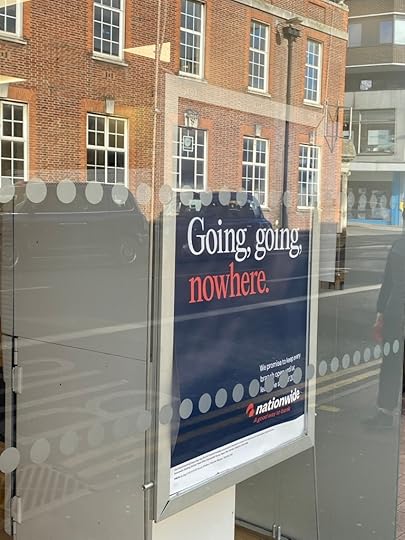Martin Jones's Blog, page 2
May 13, 2025
All Fours by Miranda July – a Road Trip Heading Home

I reserved Miranda July’s All Fours at the library after hearing it was a road trip book, and had been included on the Women’s Prize for Fiction list.
I soon realised this was not a road trip book. A woman, who has had some sort of successful, unspecified artistic career, reaches her forties and feels herself at a turning point. She decides to go on a solo road trip across America, but only gets as far as a motel about half an hour from home. Here she has a kind of highly creative breakdown, employing her significant personal wealth and febrile imagination to turn her humble motel room into luxury accommodation over three days of intense effort. She then spends the next few weeks in her special room, enjoying the company of a younger man. Their affair is described in the sort of detail that Henry Miller might have used in Tropic of Cancer, if Miller’s protagonist had been a neat and tidy Californian woman rather than a seedy New York man living in Paris. Anyway, following her motel sojourn, the woman returns home and desperately tries to carry on with her normal life, pretending to her husband that her state of acute distraction is due to the menopause. And then, as if fate is having its fun, a routine medical check-up reveals that she is actually approaching this time in her life.
Rather than a road trip, All Fours is about women dealing with the menopause. Although I did wonder at this point if I was the intended audience, I kept reading. Partly this was to learn something about an experience that was not my own. All Fours is very much about the specificity of experience. As well as facing the menopause, which is specific to women, the narrator also recalls suffering a very rare complication during the birth of her child, which causes almost all of the baby’s blood to drain back into the mother. Against all odds the baby survives, but this traumatic experience stays with its mother, so that she is always looking for the few people in the world who would understand what she had been through.
So is this book actually for woman who have suffered the rare birth complication known as fetal maternal haemorrhage?
To answer that question, notice I have not mentioned the name of the narrator. This is because she isn’t given one. The lack of a name goes along with her mysterious job, never fully described. There is a lack of specificity here – like the narrator is ‘Everywoman’ or something. It makes you wonder if the fact that we all experience life slightly differently constitutes our common ground.
The trend in fiction writing is towards fragmentation, with different books designed for different groups of people. Of course people have always read novels to take them outside their normal experience, just as they’ve always wanted to go on road trips to new and unfamiliar places. But every road trip eventually brings you home again, and a novel, if it’s good, will still reflect something that we all tend to recognise as familiar. And maybe that sense is more important than ever. All Fours does both specific and general in a very interesting way.
The book might not be to everyone’s taste, but it still manages to take the individuality of taste and make you think about it, combining sparky wit with affecting emotion, particularly in the first half. I’m glad I read it.
May 11, 2025
On the Pantiles – Reading Secret Street
May 9, 2025
The Wizard of Earthsea by Ursula Le Guin – You Don’t Have to be Magic to be Magical

The Wizard of Earthsea is Ursula Le Guin’s 1968 novel about a young wizard.
We now know that young wizard stories grew up into a bit of a monster, but here we see the idea in its innocent infancy, and perhaps notice some revealing differences. Later versions saw the wizard world becoming a kind of elite, secret society, fed by a school seemingly modelled on Eton. I remember reading this kind of story with my daughter, feeling uneasy about the fact that most people are classified as boring and non-magical. Hang on a minute, I thought to myself, while wizards are flying around on broomsticks, ordinary, non-magical folk have worked out how to fly to the moon. Why present magic as something denied to most people?
The Wizard of Earthsea actually accommodates such reservations. Rather than taking a secret train to a clandestine school, Ged, a promising, young Earthsea wizard, takes the oars alongside non-magical crew on a boat, as he sails to a well known magic school on the island of Roke. After completing his education, he and his fellow students then go to various jobs around the Earthsea archipelago. Like GPs, school teachers, or vets, they are part of their communities, respected (usually) but not fundamentally different to other people. At one point Ged uses a spell to keep a shoddy boat together, but makes it clear a competent shipwright would do a better job of repairs.
This was an important aspect of a book which characteristically presents different elements of life, as complementary parts of a whole. Magic is about a balance. You can stop the wind by magic in one place, but that will make wind blow harder somewhere else – a bit like the real weather really, where you can’t have high pressure without a corresponding low. And the central struggle of the book is young Ged’s battle with the dark side of himself rather than with some external enemy.
I would suggest later versions of the young wizard story lost something when magical GPs, who used their particular skills to help humanity in general were replaced by wizards going to a secret school, divided into competing, self-regarding houses, educated to work for their own closed society. A sign of divided times perhaps, or at least authors with different outlooks. Similarly, Le Guin did not see her apparent children’s story as just for children. She didn’t really believe in such literary pigeon-holing. Since the 1960s, fiction writing has become highly fragmented into different categories of stories for different categories of people. However, in Earthsea, magical and non-magical people do not seem to have different songs or stories. The fact that a child or adult would have an equal chance of enjoying the Wizard of Earthsea is a reflection of what this book is about.
April 27, 2025
The Count of Monte Christo Meets Batman

The Count of Monte Cristo is a nineteenth century novel, first serialised to a huge and enthusiastic readership, before being published in book form in 1846. And while the name Alexandre Dumas is on the front cover, Dumas was actually less author, more boss of the sort of studio writing room you might see in Hollywood television and film production today.
The book produced in an unexpectedly modern manner, also has a modern feel. Once I read past the opening chapters, I couldn’t help seeing parallels with, of all things, the Batman franchise.
A promising young sailor called Edmond Dantes is wrongly imprisoned after being implicated in an anti-government plot by two men jealous of his professional and personal success. A corrupt judicial official realises the charge is baseless, but for personal reasons allows Edmond to go to prison anyway. During long years of incarceration, Dantes meets a brilliant fellow prisoner, who provides both an education and the promise of a hidden fortune. Although the friend dies in prison, Dantes himself eventually escapes, travels to the island of Monte Cristo, where in a cavern, he finds the fabled riches he was promised. Dantes swears vengeance on those who wronged him, using the resources now at his disposal. It was at this point that I started thinking of Batman – a brooding, powerful, fabulously wealthy man, operating incognito from a secret underground lair, determined to bring justice to Gotham City.
Batman inhabits a world that tends to lack moral certainties. He fights crime as an individual, dealing out arbitrary justice, acknowledging no authority but his own, a dark and threatening vigilante of the night. Edmond Dantes in his new guise as the Count of Monte Cristo is similar. Wronged by the justice system, he does not acknowledge the law’s authority, setting himself up as judge, jury and potential executioner all in one. Like Batman, the Count, despite the apparent righteousness of his cause, is another vigilante of the night, his skin left permanently pale by all those years in a dungeon.
Nineteenth century France, like Gotham, is not a stable moral universe. Just as Dantes comes to realise that the awful ordeal of prison was the making of him, he discovers that trying to punish people for past crimes, or reward them for past services, is complicated by some recipients benefiting from punishment, or suffering from reward. A poor man given a diamond is left vulnerable to suspicious gendarmes, or jealous acquaintances. A rich family losing its wealth sees some family members gaining a new freedom outside the former gilded cage. There is one section where a lot of poisonings take place, and interestingly these scenes serve to demonstrate that a poison is not intrinsically a destructive thing, when the only difference between a poison and a medicine is the dose. As someone who works in a pharmacy I could appreciate that sort of medicinal philosophising.
Edmond Dantes goes on a very long journey in taking his revenge. He might initially have been critical of God for not doing a good enough job with dealing out justice, apparently letting evil triumph and virtue suffer. However, like most jobs, it turns out to be a bit more tricky when you have a go yourself.
The Count of Monte Cristo is a huge, epic, gothic adventure, with a gift for its reader. It won’t make you a billionaire, or solve all your problems. However, it does provide a fascinating insight into the ambivalent nature of reward and loss.
April 23, 2025
Secret Street Reading On Ashdown Forest
So the plan was to go to Ashdown Forest over the April bank holiday weekend, and record a video of me reading scenes from my novel Secret Street set there. It was freezing cold, blowing a force eight gale, but we did our best. Thank you to Sharon, producer, director, camera operator, location catering manager and motivational coach 
March 24, 2025
Ubik by Philip K. Dick – Update Your Antivirus

Ubik by Philip K.Dick is a science fiction story, published in 1969, now considered a classic. It appears on Times Magazine’s list of best novels since 1923.
The book imagines a version of 1993 where people with telepathic powers use their skills to gain access to valuable information. They are like psychological computer hackers. Individuals with ability to block these hackers form themselves into what you might call antivirus companies, known as prudence organisations. For a fee they will block the telepaths. There is a constant tension between these two sides, which reaches a crisis point when the anti telepaths are lured to a base on the moon, where, apparently, their leader Glen Runciter is assassinated. Then, under pressure from competing mind-bending powers, time seems to slip backwards as the anti telepaths fight for survival. Our threatened group is helped by a mysterious substance called Ubik, which appears in all sorts of guises, ranging from hair products to medicines – a kind of all-inclusive useful stuff, whose name derives from the word ubiquitous, meaning everywhere.
Alright. Let’s take a moment. A tricky, complicated story. What to make of it? There’s a kind of amorphous quality that invites theories, which many readers have duly provided.
For me, I suppose I made sense of it in the virus/antivirus comparison. Antivirus companies wouldn’t be necessary if people didn’t make viruses. And most of the time you have no idea if a virus is threatening your system, requiring the protection you are paying for. There is an element of unreality about the whole situation, cooked up between two opposing sides, who after much expensive trouble, end up back where they started when there was no virus. Everyone expends a lot of energy to get precisely nowhere. And the medicine to make it all better is ambivalent to say the least, coming in many forms, with warnings of side effects if not used as directed. After all, the one thing that an antivirus company needs to keep it going is a good supply of viruses to protect against. You might imagine an antivirus company, short of things to do, cooking up its own threats, the medicine becoming the poison. Ubik, the book and the substance, is a bit like that.
‘Could the prudence organizations be, in fact, rackets? Claiming a need for their services when sometimes no need actually exists?’
This is not the most straight-forward of reads, jumping around in viewpoint and setting, with a kind of spare writing style that leaves much of the work of imagining scenes to the reader. But there are interesting ideas that save a potentially chaotic project. You have this fascinating struggle, deriving from ancient dualities of good and evil, presented in a modern story about data theft. For me, Ubik was a book that seemed better in retrospect, thinking abut it afterwards. It kind of took me on a bizarre and confusing journey only to bring me back to where I started. This could have felt like a waste of time and effort to get nowhere in particular. Instead it was more like a crazy trip before the relief of home-coming.
March 15, 2025
The Crying of Lot 49 by Thomas Pynchon – Voting by Post

Thomas Pynchon’s The Crying of Lot 49, published in 1966, is about conspiracy. While the internet has become a Petri dish for conspiracy, people have long been attracted to the apparent presence of hidden controlling influences in life, whether they actually exist or not.
The setting for The Crying of Lot 49 conspiracy is, of all things, the postal service. A woman named Oedipa Maas, while acting as executor for Pierce Inverarity, her hugely rich former boyfriend, seems to stumble on the existence of the Tristero, an unofficial postal service with roots going back to the Holy Roman Empire. At first the idea of a postal system conspiracy seems merely quirky, as we explore the niche arcana of stamp collecting and postmarks. But then you begin to realise that because the postal service was for centuries the means by which society communicated on a wide scale, control of the mail becomes a way of controlling society. If that sounds far-fetched, remember that even in the age of electronic communication, there have been controversies about politicisation of the U.S. Postal Service, and the effect this might have on postal voting.
So, we follow Oedipa on her tortuous, confusing and sometimes very funny path towards revealing the existence or otherwise of the Tristero. What the outcome of this investigation might be is a tricky thing to reveal, even if I wanted to provide a spoiler.
Personally, I think you can find a clue to the enigmatic truth of this book in the twists of its language. Characteristically, a sentence will seem to be going in one direction, before going off somewhere else. As a general illustration, look at the word ‘God’ which consistently appears as an exclamation doing double duty as a proper noun. Some examples:
‘Now here was Oedipa, faced with a metaphor of God knew how many parts.’
In this sentence, if there were a full stop after ‘God’ it would be a name for a deity. But we then skitter on into the ‘knew how many parts’ bit, causing the word to slide into an exclamation of confusion.
‘That night she sat for hours, too numb even to drink, teaching herself to breathe in a vacuum. For this, oh God, was the void.’
Once again God can be a noun, as in Oedipa appealing to God, while also serving as an exclamation of frustration at the absence of any such thing.
‘Suppose, God, there really was a Tristero then and that she had come on it by accident.’
Same again. The presence suggested by God as a noun disappears into a throw-away exclamation.
Finally have a look at this passage, where we get the God as noun/exclamation trick twice in quick succession.
She looked around, spooked at the sunlight pouring in all the windows, as if she had been trapped at the centre of some intricate crystal, and said “My God.”
“And I feel him, certain days, days of a certain temperature,” said Mr Thoth, “and barometric pressure. Did you know that? I feel him close to me.”
“Your grandfather?”
“No, my God.”
For me, this characteristic use of the word ‘God’, reveals much about the enigmatic nature of hidden controlling influences in The Crying of Lot 49. As soon as shadowy forces become real enough to be named, they disappear again, provoking an exclamation of shock and surprise.
As I was reading my way through all of Pynchon’s twisty sentences, there were times when I did wonder if I was actually enjoying the experience. But by the end I could only feel impressed. The Crying of Lot 49 is very interesting, in a rarified, philosophical way, and also in a more down to earth sense, surprisingly relevant to twenty first century political and social concerns
March 6, 2025
Greek Lessons by Han Kang – Learning a Language

Greek Lessons is a novel by the Korean author Han Kang, who won the 2024 Nobel Prize for Literature. It’s about a woman who can’t speak, developing a relationship with the tutor of her Ancient Greek class, who is losing his eyesight.
This is a book about the contradictory development of language.
If that sounds abstruse as a topic, then I would agree.
There’s one chapter which opens with two Ancient Greek words which look almost identical on the page. Forgive me if I don’t reproduce them, but my keyboard doesn’t stretch that far. I’ll just quote the comment that follows them:
‘These two verbs mean ‘to suffer’ and ‘to learn’. Do you see how they’re almost identical? What Socrates is doing here is punning on these words to remark on the similarity of the two actions.’
Does learning necessarily involve suffering? Well, to an extent the answer is yes. It does take some effort and discipline to learn anything. There are occasions, however, when you can learn without too much pain, maybe even enjoy the process. This sort of learning is a less visible achievement, and is less likely to win a Nobel Prize. Maybe that’s why P.G. Wodehouse never won a Nobel Prize. Maybe that’s why comedies rarely win Oscars, though it would be hard to argue that the best comedies are not deserving of such an honour, or that comedy does not have lessons for us.
Greek Lessons was very interesting, and I’ve thought about the book a lot after reading it. The way language evolves, from pictograms, becoming sophisticated, moving into bewildering abstraction, leaving behind the experience it was meant to be communicating, and then evolving seemingly backwards in a simpler direction. The book has a rarified quality about it, and more down to earth moments, as language circles around from naivety to complexity and back again. But while I admired all that, overall I have to admit finding the book fairly hard work to read. My personal feeling is that a book like this reveals much about how we view achievement in literature. To be good it has to teach us something, and to teach us something it has to be hard work. Is that how literature should be? I don’t know. But my feeling is that it’s just as much an achievement to create something that seems like fun but is quietly teaching you things anyway. Novels developed as a diversion and an entertainment, and that flaky, showbiz history has to be part of their work, even when people study novels at university. It’s that grey area between goofing off and getting it together that somehow gives the novel as a form its particular fascination. And in a sense that’s the grey area that Greek Lessons explores as it follows language from simple to fancy and back again. Maybe in the case of Greek Lessons the work was a bit too overt. But don’t let a slacker like me put you off. Greek Lessons is an interesting book and worth reading.
March 2, 2025
The Sheltering Sky by Paul Bowles – Going, Going, Nowhere

Paul Bowles’ The Sheltering Sky is about a wealthy American couple, Port and Kit Moresby, travelling in Africa soon after World War Two. In a snobby sort of way, Port considers himself a traveller rather than a tourist, on a more meaningful journey than someone who relaxes at beach resorts and maybe pops into the occasional museum. He wants to live with the local people, eat their food, speak a few words of the language, contract their picturesque diseases, neglecting vaccination to allow for a really authentic experience. By the end of the book, Kit in particular totally immerses herself in local culture. Suffice to say both Port and Kit’s attempts to escape their own society fail in the nastiest way possible.
I was thinking about this riding to work, a type of journey which would count as neither travel nor tourism, but, whisper it, commuting. In Sheltering Sky terms, if traveller is at the top of the scale, with tourist beneath, then commuter must lurk below day-tripper and Sunday driver at the very bottom of the barrel.
Towards the end of my ride, I passed a branch of Nationwide Building Society. In the window there was an enigmatic poster displaying three words: ‘Going, going, nowhere’, I think referencing the fact that the branch would not be closing any time soon, unlike other establishments on the rapidly changing modern high street.
How ironic that my commute had revealed a poster displaying words summing up The Sheltering Sky for a struggling reviewer.
A commute is not such an inappropriate journey to be taking while considering this book. In a sense the regular, unremarkable trip to work is the most epic of voyages, made in daylight or darkness depending on the season, in rain, sun, sleet or snow, going on for years, repetitive and yet never the same twice. It’s almost like that scene in The Time Machine where the time travelling vehicle does not move, while the world changes around it.
Similar contradiction surrounds Port and Kit’s journey. We discover early on that they go to Africa with the aim of repairing their crumbling marriage. But Port, fearful of the responsibilities that a committed marriage would involve, half-unconsciously sabotages the whole project by bringing along a young male friend, with whom Kit might very well have an affair. From this shaky starting point, the travellers ride on bone-shaking night buses, chaotic trains, and meandering camel convoys over endless dunes. There is even a bike excursion. There are horrible accommodations, illness and madness in unfamiliar and dramatic landscapes. It’s truly a hellish trip.
And yet, all that being said, there is, believe it or not, a strange reassurance to be found. The world of The Sheltering Sky is undoubtedly vast and hazardous, but it is actually hard to get lost there. The journey designed to both save and sabotage a marriage has accelerator and hand-break working against each other, so the car does not move. The whole trip is like this. It goes a long way and doesn’t move at all. So yes, in the physical sense the travellers go places, but in other ways not so much. There is no gone after all the going.
‘The Sahara’s a small place really, when you come right down to it. People don’t just disappear there. It’s not like it is here in the city.’
So, a beautifully written, bleak and sometimes harrowing book, which offers an unexpected reassurance, that you can take the longest journey and be home again in time for tea
February 19, 2025
The Proof Of My Innocence by Jonathan Coe – White Doves and Pigeons

The Proof Of My Innocence by Jonathan Coe, is a kind of self-referencing, meta-fictional (whatever the right term is) account of a group of 1980s Cambridge graduates, some of whom get involved in extreme right wing politics. A young woman recently out of university – a child of this 1980s generation – tells the story of what happens forty years later, when those who turned sharp right out of university reach a final showdown with those who took a gentle left, or just wandered straight on. This is the young woman’s first attempt at a novel, and it combines the three genres she decides to try – cosy crime, dark academia and auto fiction.
So these three genres. Auto fiction – writing based on the writer’s own life. Dark academia – the story of a tightly linked group of people who meet at an ancient university, and typically deal with some violent secret. Cosy crime, where a murder takes place in a charming English village or country house, the crime usually solved by a combination of local detective and keen civilian.
All these genres are used to reflect the reality of modern Britain.
Cosy crime? Well for this I’m going to take you away from the book for a moment, to an odd garden near where I live, a small fenced compound by the river, probably associated with a mooring. The fencing is seven feet high, topped with reams of barbed wire twisted together with fairy lights and wind chimes. The narrow space within is full of the most twee British miniature landscapes, made with fake grass and blue-coloured glass pebbles to indicate rivers. This tiny shire is peopled by hundreds of large and small figurines – gnomes dressed in Union Jack outfits, a king and queen waving to their subjects, a grandma doing some knitting, a bride with a bouquet. There is a towering aviary at one end, where white doves come and go. Well, they were white. Now there are a number of mottled birds, as the white doves have interbred with local pigeons. It was on the bird enclosure that the owners of this garden placed their Brexit Party and Vote Leave banners. This bizarre enclosure reminds me of cosy crime, apparently small scale, gentle, traditional, but with barbed wire twisted into its fairy lights and tinkling chimes.
Dark academia is similar, characteristically British, traditional, ordered and disconcertingly violent, particularly when its order and tradition are threatened.
Then there is auto fiction based on yourself as an individual. One of the 1980s dark academia characters goes to a lecture during his Cambridge days. The lecturer talks about the idea of the double act in show business, as a tiny model for society, where people get irritated with each other, fall out, make up, laugh, and rely on each other. One of the most popular double acts of the 1970s was Morecambe and Wise. Eric Morecambe died in May 1984. As the lecturer explains, it was Ernie Wise without Eric who on New Year’s Day 1985 made the first official public mobile phone call in the UK. A mobile phone became a signature of a society focused on individuals, a society of cultural fragmentation. Ernie’s call coincided with Margaret Thatcher’s government, and the rise of the Right as a major force in Britain.
All three genres are linked by the idea of money, as in cosy crime and dark academia tending to be settings of wealth, and many of the characters we meet in The Proof Of My Innocence expressing their individual course in life in terms of making money. Right wing politics links money with personal worth. You are a valuable person if you have lots of money. You get what you deserve in terms of money, and if you don’t have it you aren’t a valuable person. The Proof Of My Innocence is set in the aftermath of the pandemic, a time when people doing ordinary jobs – nurses, carers, refuse collectors – kept things going. If we didn’t realise it already, covid revealed the disconcerting fact that money does not reflect the importance of a job that someone does. Are you good at football? Singing? Do you want to trade in commodities you never make, grow, or see? If the answer is yes you might get rich. But that wealth is not necessarily a reflection of your quality as a person and your value to society. As portrayed in the book, the Right did not like the pandemic. Yes there was clapping for health care workers, but from some quarters there was also a lot of protest about lockdowns and mask wearing. That long, grinding crisis upset a clear world view based on value and social worth linked to money.
The Proof Of My Innocence presents a portrait of extreme right wing politics as selfish, money orientated, fundamentalist, making a false equivalence between wealth and social value. The stable, traditional values of the right are portrayed ironically as an expression of a modern, technology-driven self-centredness, trampling on the equally old fashioned virtues of compromise and consensus. Barbed wire is twisted in the fairy lights.
The Proof Of My Innocence is a very interesting novel, with the readability of the popular genres it uses. It might sound heavy going re-reading what I have said above, but that’s not the case. It’s entertaining, subtle and clever, celebrating moderation and compromise, none of which gets in the way of an uncompromising picture of the dangers of extreme right wing politics.



